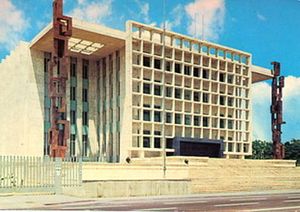On February 26, Iranians will head to the polls to elect a new group of legislators for the country’s majlis, or parliament, and also to elect a fresh cohort of religious scholars for the next eight-year term of the 88-member Assembly of Experts. These elections are taking place at an interesting time. Iran’s economy is slowly reintegrating with the rest of the world after major sanctions relief from the United States, European Union, and the United Nations for its successful implementation of the Joint Comprehensive Plan of Action, the international agreement to limit its nuclear program. Additionally, Iran’s supreme leader, Ayatollah Ali Khamenei, the most important locus of power in the Islamic Republic, is frail and old. His death would necessitate the selection of a successor–to be chosen by the Assembly of Experts. Thus, politically, Iran appears to be primed for change.
However, the upcoming election does not necessarily invite optimism that the fortunes of the country’s so-called moderates are looking up in the country. Iran’s democratically elected political leadership since 2013 has been deemed by many outside the country–particularly in the west–as representing a new sort of hope for the country’s moderates. Indeed, Hassan Rouhani, the country’s president since 2013, largely reversed the intransigent bellicosity that had defined Mahmoud Ahmadinejad’s time leading Iran. Iran’s theocratic political system, in place since the Islamic revolution of 1979, however, limits the ability of the country’s president in important ways.
Notably, it’s a simplistic view of Iranian politics to assume that an effusion of optimism about the country’s future after the nuclear deal, which was largely enabled by the so-called moderate leadership of Rouhani, will lead to an electoral victory for similarly moderate legislators and Islamic scholars to the majlis and Assembly of Experts respectively. Taking this view of the country’s politics ignores the absolutely central role of the Guardian Council, a political body that has few analogs in other political systems.
The Guardian Council is perhaps best analogized as the amalgamation of an election monitoring body and a Supreme Court. In the Iranian context, the group is tasked with ensuring ideological continuity with the revolution that Ruhollah Khomeini, the founder of the Islamic Republic, envisioned in 1979. The way the Guardian Council exercises this power in reality is hugely important: without its imprimatur, candidates cannot appear on the ballot on election day. In reality, this means that reformists and moderates of all stripes are banned from participating in the elections.
In the past month, we’ve seen the Guardian Council make some important decisions that serve as a barometer of just how much change should be expected in the upcoming elections. In late January, news emerged that of 30,000 candidates that could reasonably be described as “reformist” in their views, the Council approved a vanishingly small number: 30. In February, the Council eased up a bit, reversing its decision for 1,500 candidates. Currently, a total number of 6,200 candidates are expected to run for Iran’s 290-seat majlis. It’s not clear just how many of those candidates are moderates and reformists. Similarly, 74 percent of candidates interested in the Assembly of Experts were prohibited from running.
I’d written in these pages in early January that one candidate in particular, with a very familiar name in Iranian politics, was worth watching as the bellweather of reformism in the upcoming election. Seyyed Hassan Khomeini, grandson of the Islamic Republic’s founder and first supreme leader, was banned by the Guardian Council. Khomeini was ultimately disqualified by the Guardian Council, sending a clear message that the body wasn’t ready to tolerate a surge of reformism. Khomeini’s ban led Iran’s former president Ali Akbar Hashemi Rafsanjani to criticize the Guardian Council in no uncertain terms: “Where did you receive your qualification? Who gave you permission to judge? Who gave you the podium of Friday prayers and state television?”
In light of these factors, I’d caution excessive optimism for a reformist and moderate surge after the February 26 elections. If change does come to Iran after these elections, it will be gradual and staggered. Everything about this election is being carefully stage-managed by the Guardian Council and it’s highly unlikely that the conditions will exist in Iran for a Gorbachev-esque figure rising to the rank of supreme leader after the 76-year-old Khamenei’s death.
It’s tempting to see the ostensible success of the recent nuclear deal, Khameni’s poor health and age, and Iran’s improving economic conditions as creating an environment ripe for the success of moderates and reformists. The country’s political institutions, particularly the Guardian Council, are an important constraint on what’s possible through elections.

































